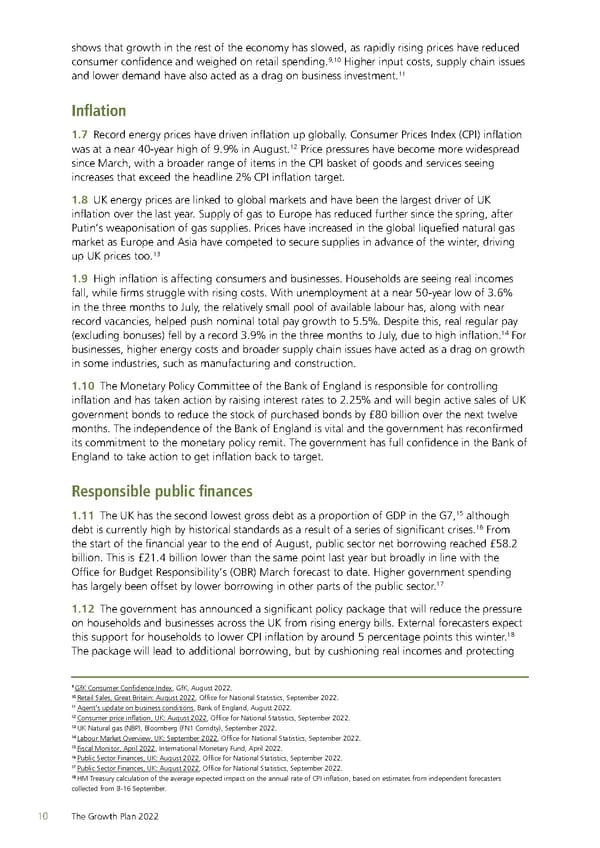shows that growth in the rest of the economy has slowed, as rapidly rising prices have reduced 9,10 consumer confidence and weighed on retail spending. Higher input costs, supply chain issues 11 and lower demand have also acted as a drag on business investment. Inflation 1.7 Record energy prices have driven inflation up globally. Consumer Prices Index (CPI) inflation 12 was at a near 40-year high of 9.9% in August. Price pressures have become more widespread since March, with a broader range of items in the CPI basket of goods and services seeing increases that exceed the headline 2% CPI inflation target. 1.8 UK energy prices are linked to global markets and have been the largest driver of UK inflation over the last year. Supply of gas to Europe has reduced further since the spring, after Putin’s weaponisation of gas supplies. Prices have increased in the global liquefied natural gas market as Europe and Asia have competed to secure supplies in advance of the winter, driving 13 up UK prices too. 1.9 High inflation is affecting consumers and businesses. Households are seeing real incomes fall, while firms struggle with rising costs. With unemployment at a near 50-year low of 3.6% in the three months to July, the relatively small pool of available labour has, along with near record vacancies, helped push nominal total pay growth to 5.5%. Despite this, real regular pay 14 (excluding bonuses) fell by a record 3.9% in the three months to July, due to high inflation. For businesses, higher energy costs and broader supply chain issues have acted as a drag on growth in some industries, such as manufacturing and construction. 1.10 The Monetary Policy Committee of the Bank of England is responsible for controlling inflation and has taken action by raising interest rates to 2.25% and will begin active sales of UK government bonds to reduce the stock of purchased bonds by £80 billion over the next twelve months. The independence of the Bank of England is vital and the government has reconfirmed its commitment to the monetary policy remit. The government has full confidence in the Bank of England to take action to get inflation back to target. Responsible public finances 15 1.11 The UK has the second lowest gross debt as a proportion of GDP in the G7, although 16 debt is currently high by historical standards as a result of a series of significant crises. From the start of the financial year to the end of August, public sector net borrowing reached £58.2 billion. This is £21.4 billion lower than the same point last year but broadly in line with the Office for Budget Responsibility’s (OBR) March forecast to date. Higher government spending 17 has largely been offset by lower borrowing in other parts of the public sector. 1.12 The government has announced a significant policy package that will reduce the pressure on households and businesses across the UK from rising energy bills. External forecasters expect 18 this support for households to lower CPI inflation by around 5 percentage points this winter. The package will lead to additional borrowing, but by cushioning real incomes and protecting 9 GfK Consumer Confidence Index, GfK, August 2022. 10 Retail Sales, Great Britain: August 2022, Office for National Statistics, September 2022. 11 Agent’s update on business conditions, Bank of England, August 2022. 12 Consumer price inflation, UK: August 2022, Office for National Statistics, September 2022. 13 UK Natural gas (NBP), Bloomberg (FN1 Comdty), September 2022. 14 Labour Market Overview, UK: September 2022, Office for National Statistics, September 2022. 15 Fiscal Monitor, April 2022, International Monetary Fund, April 2022. 16 Public Sector Finances, UK: August 2022, Office for National Statistics, September 2022. 17 Public Sector Finances, UK: August 2022, Office for National Statistics, September 2022. 18 HM Treasury calculation of the average expected impact on the annual rate of CPI inflation, based on estimates from independent forecasters collected from 8-16 September. The Growth Plan 2022 10
 The Growth Plan 2022 Page 10 Page 12
The Growth Plan 2022 Page 10 Page 12